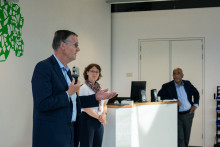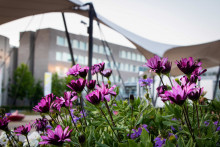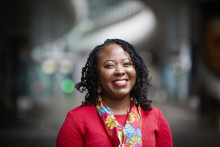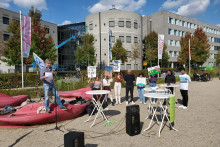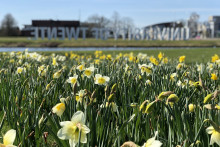Since February, six ‘Sustainability Dialogues’ have taken place in the DesignLab, where students and employees could discuss which goals the university should pursue to achieve more sustainability. Yesterday, the last dialogue of the series took place, where the Executive Board of the UT presented its way of translating the students' concerns into concrete goals for the university for the coming years.
‘Do not form an island’
For many, especially climate activists at UT, perhaps the most important announcement from the executive board was that the UT will not cut – or freeze – ties with the fossil fuel industry. ‘If we cut all ties with the fossil fuel industry, we lose any form of meaningful interaction’, explained rector Tom Veldkamp. ‘We need to be open to society, and that includes the fossil fuel industry interaction in our education and research. We don't have to agree with the industry, but dialogue is important.’
President Vinod Subramaniam also commented on the idea that the UT should cut ties with the fossil fuel industry. ‘We should make sure that we do not form an island here on campus. It is not a good idea to cut ties, because as a university we want to have an impact on society, not turn our backs on it. And the fossil fuel industry is part of our society.’ In this context, Veldkamp also thought that some of the students demands were not practicable. ‘We also have to be realistic; I mean, we can't change capitalism. And a lot of discussions we heard in the last dialogues were about getting rid of capitalism.’
Support teachers
Some students wished that sustainability should be addressed more in the various study programmes. Veldkamp agreed, and called for more insight in that regard. 'There is already a lot of attention to sustainability in the study programmes. The problem is that we don't know exactly how much. My main message is that we need to find out what is happening in the curricula and that we need to support teachers who want to include more information about climate change and sustainability in their teaching.’
Reporting
Vice President of the Executive Board Machteld Roos emphasised that visibility is a point of attention. 'One of the overarching themes was the visibility of sustainability. As a university we are already doing a lot for sustainability, but only a few people see that. In the next few years, we should report much more on our sustainability results. Because we do have our goals as a university, and we need these results to assess what is working and what is not working.’



